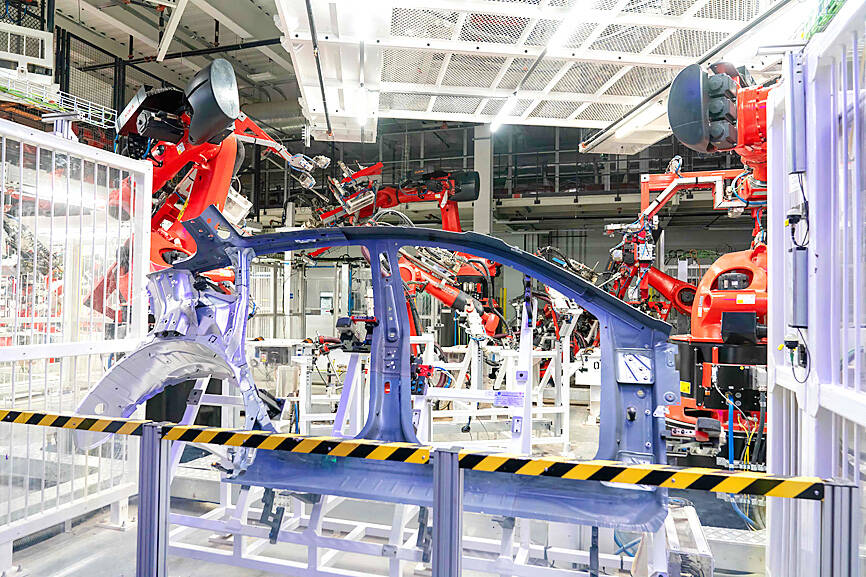Elon Musk has tapped a longtime Tesla Inc executive in China who oversaw construction of the Shanghai gigafactory to help run the electric automaker’s newest plant in Austin, Texas, people familiar with the matter said.
Tom Zhu (朱曉彤), who joined Tesla in 2014 to help build its Supercharger network and most recently has been heading the automaker’s Asia-Pacific operations, is in Austin this week and has brought some of his engineering team from China with him to assist in overseeing the ramp-up of Giga Texas — a US hub for the Model Y and future production of the Cybertruck — the people said.
It is not clear how long Zhu would be in Austin, or whether he would retain his Asia responsibilities, the people said.

Photo: AFP
The shift of Zhu to Austin comes as Tesla has been trying to increase output at its new Texas factory. The US electric vehicle pioneer originally planned to make Model Y sports utility vehicles using its new, larger 4680 lithium-ion cells at the plant, which Musk referred to as a “money furnace” earlier this year.
However, instead Tesla has pivoted to using older 2170 cells considering the new batteries were not ready for volume production.
It also comes as Musk has been spending time running Twitter Inc after acquiring the social media platform in late October. He is also chief executive of Space Exploration Technologies Inc and founded tunneling firm The Boring Co and brain-chip developer Neuralink Corp.
Musk’s US$44 billion acquisition of Twitter has sparked concerns about how he is dividing his time between his many companies and has also weighed on Tesla’s stock, which is down about 50 percent this year. Indeed, Musk himself as recently as last month admitted he has “too much work” on his plate.
Zhu for years was Tesla’s top executive in China, the electric vehicle maker’s biggest market outside of the US. Tesla’s factory in Shanghai makes Model 3 and Model Y vehicles for domestic consumption, and for export to other parts of Asia and Europe. It was recently upgraded to double the plant’s capacity to about 1 million vehicles a year and shipments last month soared to a record 100,291 vehicles.
Musk has also often expressed admiration for the Chinese work ethic, praising Tesla China employees for “burning the 3am oil” while saying that Americans are “trying to avoid going to work at all.”
The billionaire famously caused a stir earlier this year when he gave workers at Tesla globally an ultimatum: Return to the office or go and work elsewhere.

With an approval rating of just two percent, Peruvian President Dina Boluarte might be the world’s most unpopular leader, according to pollsters. Protests greeted her rise to power 29 months ago, and have marked her entire term — joined by assorted scandals, investigations, controversies and a surge in gang violence. The 63-year-old is the target of a dozen probes, including for her alleged failure to declare gifts of luxury jewels and watches, a scandal inevitably dubbed “Rolexgate.” She is also under the microscope for a two-week undeclared absence for nose surgery — which she insists was medical, not cosmetic — and is

CAUTIOUS RECOVERY: While the manufacturing sector returned to growth amid the US-China trade truce, firms remain wary as uncertainty clouds the outlook, the CIER said The local manufacturing sector returned to expansion last month, as the official purchasing managers’ index (PMI) rose 2.1 points to 51.0, driven by a temporary easing in US-China trade tensions, the Chung-Hua Institution for Economic Research (CIER, 中華經濟研究院) said yesterday. The PMI gauges the health of the manufacturing industry, with readings above 50 indicating expansion and those below 50 signaling contraction. “Firms are not as pessimistic as they were in April, but they remain far from optimistic,” CIER president Lien Hsien-ming (連賢明) said at a news conference. The full impact of US tariff decisions is unlikely to become clear until later this month

GROWING CONCERN: Some senior Trump administration officials opposed the UAE expansion over fears that another TSMC project could jeopardize its US investment Taiwan Semiconductor Manufacturing Co (TSMC, 台積電) is evaluating building an advanced production facility in the United Arab Emirates (UAE) and has discussed the possibility with officials in US President Donald Trump’s administration, people familiar with the matter said, in a potentially major bet on the Middle East that would only come to fruition with Washington’s approval. The company has had multiple meetings in the past few months with US Special Envoy to the Middle East Steve Witkoff and officials from MGX, an influential investment vehicle overseen by the UAE president’s brother, the people said. The conversations are a continuation of talks that

CHIP DUTIES: TSMC said it voiced its concerns to Washington about tariffs, telling the US commerce department that it wants ‘fair treatment’ to protect its competitiveness Taiwan Semiconductor Manufacturing Co (TSMC, 台積電) yesterday reiterated robust business prospects for this year as strong artificial intelligence (AI) chip demand from Nvidia Corp and other customers would absorb the impacts of US tariffs. “The impact of tariffs would be indirect, as the custom tax is the importers’ responsibility, not the exporters,” TSMC chairman and chief executive officer C.C. Wei (魏哲家) said at the chipmaker’s annual shareholders’ meeting in Hsinchu City. TSMC’s business could be affected if people become reluctant to buy electronics due to inflated prices, Wei said. In addition, the chipmaker has voiced its concern to the US Department of Commerce